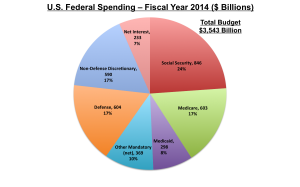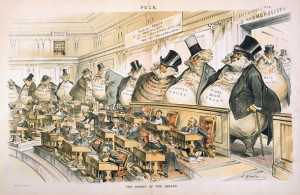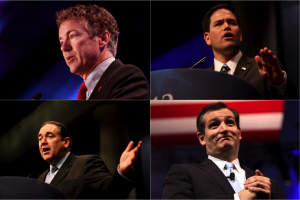What will the American society of the future look like? What do Americans want it to look like? It could be the America of the Gilded Age, with its Robber Barons and mass poverty. It could be America of the Great Prosperity, the America ushered in by FDR. Where do Americans want their leaders to take them? It is an important question. Maybe the most important one. Without a vision of a better future one can hardly be expected to confidently navigate the country through the rough waters of global and domestic challenges lying ahead. Anyone aspiring to lead a nation should have a solid idea of where to take it and the means necessary to achieve his vision. All the more troubling is the insistence of a large number of presidential candidates to either refight long lost battles of the past or to sell a vision that chooses the Gilded Age over the Great Prosperity or no vision at all.
One can only guess what world candidates like Ted Cruz, Rand Paul, Mike Huckabee or Marco Rubio live in. But according to their public platforms none seems to either understand the key issues facing the country or if they raise valid points like reforming the too complex tax code they argue in the exact wrong direction. None of the Republican candidates even acknowledges legalized corruption or excessive inequality as an issue. On the contrary, their platforms look like they have been drafted in direct cooperation with the Business Roundtable and dipped in bucket of phony patriotism. They are mind-blowingly inaccurate in their assertions, contradictory and in part childish in their simplistic appeal to emotions.
Overarching themes of all Republican platforms are cutting taxes, strong national defense and the sanctity of life and it is debatable that any of these topics are among the most pressing issues facing the nation. Cutting taxes ties into the idea of “small government” which propagates that shrinking the government by the means of withholding tax revenues is in itself commendable. In reality the size of government has to match the number of services it is supposed to provide. If cutting taxes results in a lack of oversight of the financial industry, which in turn leads to another economic meltdown, no one can argue that smaller government is necessarily better. Hence, the idea that shrinking the government is in itself a good thing and will solve the nation’s problems is fiction, as is the assertion that the Obama administration’s taxation and spending is unusually high. Internationally the United States tax to GDP ratio is one of the lowest among the developed nations and tax receipts under Obama measured against GDP are among the lowest since the 2nd World War. The basis for the argument to cut taxes is simply flawed and renders any policy using it meaningless and misguided.
Closely related to taxation is the issue of federal debt. It is another top priority listed by most Republican candidates. Identifying the federal debt as too high is a fair point to make although it is sustainable at current levels and the US will certainly not default since it has control of its money printing ability and the recent past has shown that despite an excessive increase of the money supply inflation is negligible. Regardless, the national debt is high and its reduction a viable endeavor to pursue. But the ideas put forward are as far from satisfactory as they are contradictory and hypocritical. In the face of record high levels of wealth accumulation and record low levels of effective individual tax rates not a single candidate propose raising revenue. Instead they put forth the aforementioned tax cuts, which will only exacerbate the problem, and a “Balanced Budget Amendment”. The amendment in itself will not fix the deficit but it will prevent deficit spending and since the government every year borrows to cover its outlays it would have to immediately raise taxes or cut spending to adhere to the amendment. Raising taxes is not a Republican option which leaves only spending cuts. Now, since the military consumes 50% of the nation’s discretionary spending and the United States spends as much on its military as the next 10 largest military spenders in the world combined it would be the natural pick. Surprisingly, none of the candidates recommends cutting defense. On the contrary, all suggest “strengthening” defense: increasing the defense budget, a measure that will increase the deficit even further.

Federal Spending 2014. – source CBO
Where do the savings come from? The suggestion is for one Social Security. A program that has an 80% approval rating among the American public, has lifted millions out of poverty and has not contributed a single dollar to the deficit. A suggestion utterly without merit. Idea no. 2 is to cut Medicaid and Medicare, programs that provide health care for the poor and elderly. Again, a highly misguided proposal. It is true that the outlays for medical programs will rise as the Baby Boomer generation retires and it will put a higher burden on the government’s budget. But only for the owners of a very special mindset the logical solution is to cut medical coverage for millions. Instead a first step to reign in cost could be to eliminate Medicare Part D and decrease the programs cost by allowing for negotiation between the government and the pharmaceutical industry. Nobody would lose coverage and highly profitable corporations, not the poorest Americans, would pay the price. But this would be a marginal improvement to an already dissatisfactory health care system. The most effective way to reign in cost, however, would be the introduction of a single payer system, which has proven to work and produces superior results around the world. None of the candidates suggests either solution.
A cut in Medicaid and Medicare for the poor and elderly would directly reduce prevention, increase overall cost in the system for the treatment of more terminally ill and decrease life spans of those subjected to cuts. The candidates in effect would rather increase the suffering of millions of the already poor than reduce the record expenditures for the military, introduce any kind of tax or even just close loopholes in the tax code. There are much more obvious ways to reduce the deficit. Asking the weakest members of society to bear the pain on their own entirely is unethical, shameless and backward.
Furthermore the programs are much alike in advocating for outlawing abortion. A discussion that has been had in the 70s. They declare support for Israel, the 2nd Amendment and highlight threats to national security. The federal government is described as the enemy within. Rand Paul uniquely adds libertarian focuses civil liberties and government surveillance. However, major issues relevant the United States like job creation, inequality, corruption, Global Warming or the necessity of infrastructural investment are hardly ever mentioned. If they are, cutting taxes and smaller government are the suggested solutions.
The United States faces severe problems. Money not ideas dominates its politics. Democracy is all but gone. Inequality is severe, so are poverty and the real unemployment rate. Universal health coverage doesn’t exist. Education has been declining for decades. The current generation of thirty year olds will be the first to be worse off than their parents’ generation. Yet, none of the Republican platforms addresses the issues or does even acknowledge they exist. The vision they express is an exacerbation of the status quo’s problems and their policy proposals are shamelessly pandering to the strongest elements of society. There are no bold ideas for positive, meaningful change. How will limiting access to abortions, cutting medical coverage for the poor and increasing military spending improve the American condition? The lack of legislative imagination and the level of political cowardice are breathtaking. It is a cruel irony that the Republican candidates advertise positions that would institutionalize the governmental dysfunction of Washington that they are so fond of decrying. Only one satisfied with the United States’ current situation, with the continued redistribution of the nation’s wealth to a small circle of already extremely wealthy individuals and corporations on the expense of the vast majority of Americans and the decline of the country as a whole should find the platforms offered by Republican candidates attractive. Those seeking to dramatically change the nation’s fortune will have to find that promise somewhere else.





